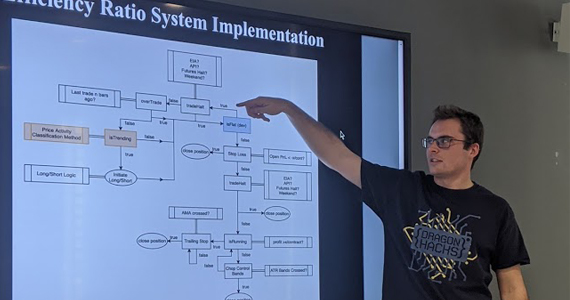Research

Students in the Custom-Designed Major pursue research at multiple levels.
Senior Capstone Project and Presentation
All CSDN students are required to complete a senior capstone project over the course of their final year at Drexel. Student conduct their research under the guidance of their faculty mentor(s). CSDN capstone projects take many shapes; in the past students' capstones have included:
- An article based on original research
- An artistic project, such as an exhibit, film, novel, or play
- The design and development of a product, process, or website
Students work on their capstone project over three-terms in three 3-credit courses: CSDN 304, 305, and 306. Generally, CSDN students submit a research proposal for their capstone project the end of their Junior year with research beginning Fall term of their Senior year. All CSDN students present their capstone research project three-times:
- Poster presentations at Crit Sessions, which occur in the final weeks of CSDN 304 and CSDN 305. Students present their topics and research through multiple phases in order to demonstrate progress and gain feedback.
- CSDN students are required to present their completed capstone projects during a showcase at the end of the academic year. Presentations are open to the wider Drexel community.
Independent Study Courses
Some CSDN students work closely with faculty to develop upper-division (300- or 400-level) independent study courses. These nuanced courses allow students to develop deeper expertise and additional skills with an expert in their field. Furthermore, students connect one-on-one with faculty who may become mentors for their capstone project. CSDN students approach faculty they want to work with and suggest a few course topics that connect to one of their concentration areas and are not offered on Drexel's campus.
A few examples of independent study courses proposed by CSDN students:
- "Popping the Sustainability Bubble" - This course will examine companies that consider themselves to be sustainable and provide clarity to the current methods that they are using in order to brand themselves in this way. We will analyze the methods brands must use in order to transform sustainable products from a niche market into a mass market.
- "The Neuro Self" - The purpose of this independent study is to explore Nikolas Rose’s sociological work on neuroscience and the “psy-“ sciences (primarily psychology and psychiatry). The goal is to gain a better understanding of how the studying of the brain and its functions (the “neuro”) has framed how we have come to understand ourselves as modern subjects. In doing so, we will examine historical, social, and scientific accounts of the brain sciences and explore how they inform our conceptions of what it means to be a person in contemporary society.
- "Gender, Subjectivity, Performativity" - This independent study will explore gender construction and subject formation through the theoretical lens of Judith Butler’s performativity. The goal is to create a foundational understanding of how gender and sexual identity are constructed, as well as the role that performance (what Butler refers to as “performativity”) plays in that construction.
- "IS in Statistical and Machine Learning Methods for fNIRS Data Analysis" - This independent study is focused on understanding and applying statistical analysis methodologies and introductory machine learning techniques to functional near infrared spectroscopy (fNIRS) data collected during behavioral tasks.